– Page first published June 23, 2021
The goal on this page is to create a list of places where the Forum has met, and the dates when it met at each place. There is much work left to do. All material below is subject to revision. Send corrections and additions by e-mail. Sources include public records, media archives, contemporaneous records and the dimming memories of those who led or participated in the Forum over the years.
But first, what led to the creation of the Forum?

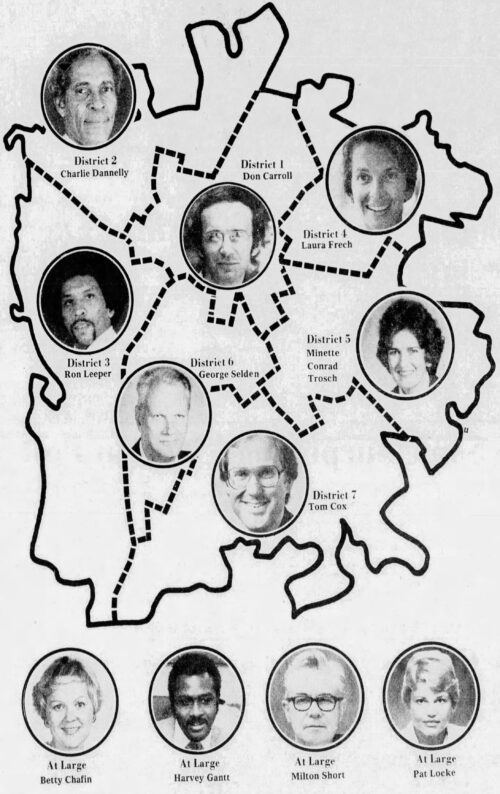
A new City Council:
The 1977 sea change
Forum lore has long held that it was district elections for City Council that created a need for an informal but regular venue for discussion between Black elected officials and their new constituents.
It was the Black Political Caucus that set about to fill the void. Forum lore has long held that the Caucus, tied up with electoral duties, asked Jim Richardson, the Rev. Bob Walton, and Sarah Stevenson to create the venue.
A new election system of four at-large and seven district representatives in 1977 swept away a seven-member, all-at-large City Council. In one of the old council’s waning terms, all incumbents belonged to the same white church and lived near one another in southeast Charlotte.
In the 1977 election, Charlie Dannelly was elected in District 2 and Ron Leeper in District 3.
In 2021, Jackie Edwards Walton wrote about those who attended the Forum in its earliest days:
“I started attending the Forum in 1978 with many of the founders attending. Those attending during that time were Phyllis Lynch, her mother, Lucille Lynch, Rev. Robert L “Bob” Walton, and Dr. Mildred Baxter Davis. Others attending included Harry Jones, Hattie Anthony, Cathy Chapman Hughes, Sam Young, Arthur Griffin, William “Butch” Simmons, Isaiah Roberson, Jewett Walker, William “Pete” Cunningham, Harvey Gantt, James “Jim” Polk, Ron Leeper, Rowe Motley, John “T-Bone” Crawford, etc.
“The only educator that dropped by occasionally was Charlie Dannelly, but a few government folks attended the Caucus meetings. Mrs. Rebecca Taylor, a Teacher Assistant, and Mrs. Anna Hood [among the first African-Americans hired by the Social Security Administration in the Charlotte area in the 1960s], were the first women elected Caucus Chair in the 1980s.

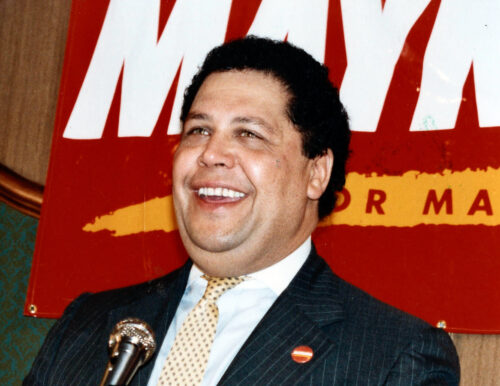
The Maynard Jackson visit
What turned discussions into action to create a forum for discussion of Black community affairs?
Forum co-founder Sarah Stevenson regularly gave credit to Sam Young for the breakfast club idea. Young arrived from Atlanta in about 1977, where he had experienced Atlanta’s “Hungry Club Forum,” which began in 1942 in the black Butler Street YMCA as an integrated breakfast meeting in a segregated city, designed to foster city improvement.
By mid-1978, Young had helped launch the Charlotte Business League, and had arranged for Atlanta Mayor Maynard Jackson to visit Charlotte. Looking back, is it possible that the idea for the Tuesday Morning Breakfast Club, later referred to as the Tuesday Morning Breakfast Forum or simply the Tuesday Forum, took root in soil tilled by the person often remembered as Atlanta’s best mayor ever?
It was Nov. 11, 1978 at the Charlotte Civic Center. The Observer’s Harold Warren reported an audience of about 500, mostly African Americans.
“‘Economic power for Afro-Americans is going to follow political power, not precede it,’ Atlanta Mayor Maynard Jackson told about 500 people in Charlotte Saturday night,” according to Warren’s account.
“Jackson spoke at the Civic Center at the first dinner, dance and awards program of the Charlotte Business League, a minority-oriented organization formed last April.
“He urged the league to form a political action committee, saying ‘public policy controls everything we do … every facet of our lives.
“‘We’d better understand that politics is serious business. We want all the friends we can find, we don’t care what color they are. I believe in bringing everybody to the table – but we ought to make sure we get to the table.
“‘We are the ones who must change our situation. No one’s going to do it for us. Those who have it (wealth) won’t even do anything to help the small white entrepreneur – so you know what chance we have….”
“Jackson… likened the plight of blacks to that of the horse being enticed by a carrot dangling just in front of its nose. No matter how hard they run, he said, blacks never quite reach a fair share of economic justice.
“‘We learned the hard way that we had to be far better to be almost equal,’ he said. ‘It’s hard enough for a small white business to make it, let alone the small black enterprise.’
“The solutions, therefore, must be won in the political arena, he said. He admonished the black business community never to ‘get a leg up on the ladder of success and then forget the folks who made it possible.’
“Instead, he said, black business and professional people should form an ‘independent network to serve the masses, not the classes.'”
– – –
Can a speech lead to historic action? “Mr. Gorbachev, tear down this wall!”
Maynard Jackson’s grandfather, John Wesley Dobbs, is remembered for a 1936 speech calling for the registration of 10,000 voters. In 1946, he followed up by helping create the Atlanta Negro Voters League, which in 51 days registered 18,000 more Atlantans to vote. That success led Mayor William B. Hartsfield to hire Atlanta’s first Black policemen, who were stationed at the Butler Street Y. Maynard Jackson, born in 1936 in Texas, grew up at that Y after arriving in Atlanta in 1945.
– – –
Sam Young, speaking from Atlanta in 2021, says his 1970s records were lost at some point during seven household moves. His record of hitting Charlotte running suggests that he likely pressed quickly the Jackson mandate to create for Charlotte an “independent network to serve the masses, not the classes.” An Observer reporter in 1982 wrote that the Tuesday Forum’s first meeting was in 1980, citing an undated letter that has not been found that was reportedly sent to African American community leaders inviting them to a meeting. In 2015 another reporter likely used the 1982 story as source for a repeat of the 1980 start date. Forum participants, however, have long insisted, as Jackie Edwards Walton does in her reminiscence above, that the first Forum meetings were years earlier.

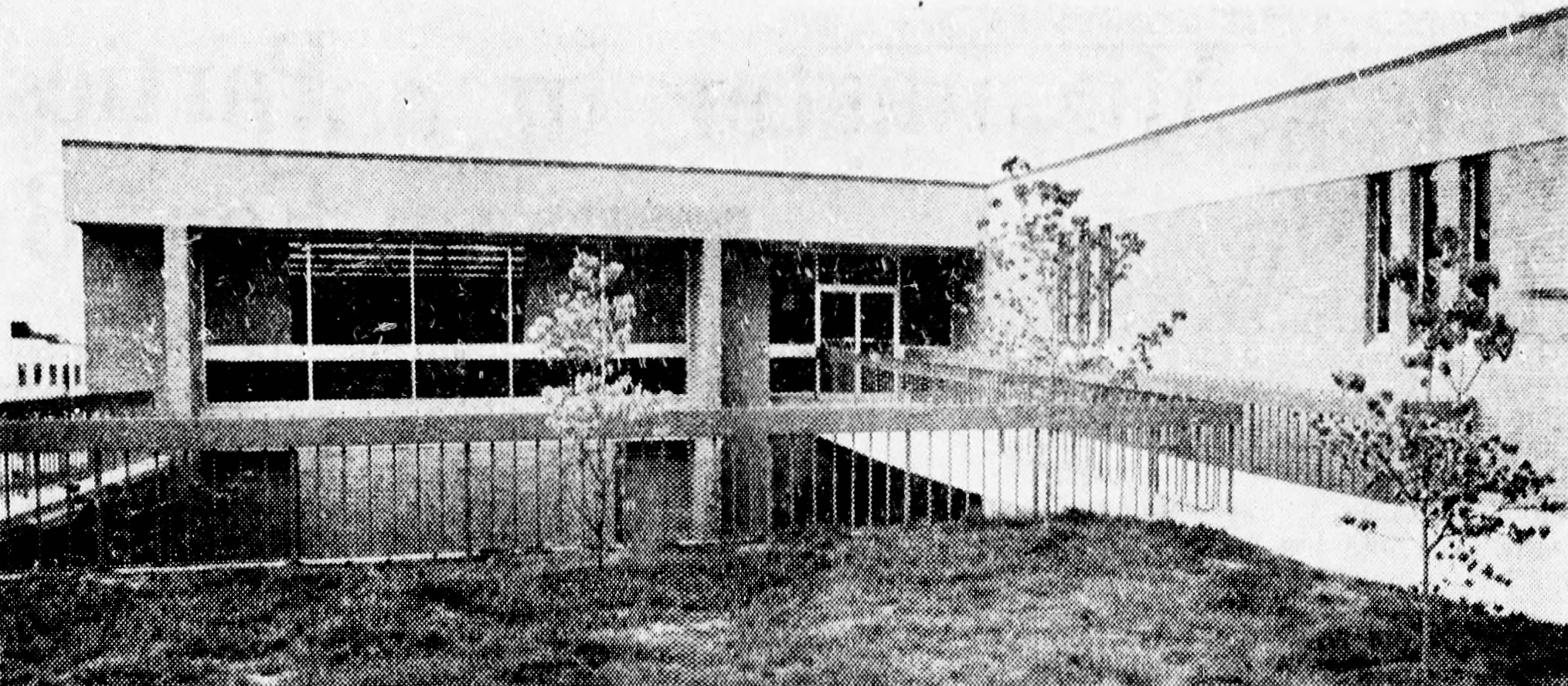
East Trade Street YWCA
This building at 418 E. Trade St. was possibly the first regular venue for Forum meetings. The arrival of the all-Black Forum at this particular building fits into a narrative of federally-financed urban removal, and white social disengagement from downtown, that was roiling Charlotte at the time. Both of those issues figured in Forum discussions from the beginning.
The 1960s urban redevelopment of the Brooklyn neighborhood, now known chiefly for its convention hotels and government buildings, targeted hundreds of homes, stores and churches, including the 1955 Phyllis Wheatley Branch at 400 S. Davidson St. The white people who controlled the YW raised money, obtained a land donation 3 miles south, absorbed the Black Phyllis Wheatley Branch into the white YW, sold the Phyllis Wheatley Branch for demolition and moved their East Trade Street offices and programs to a new 3400 Park Rd. campus in 1965. While marketed as a desegregation effort, the move to suburbia decimated Black membership in the YW, and there was loud protest.
By 1968, YW officials responded with a plan to rebuild on its Trade Street site to provide programming for the people left behind. With the money received from the Wheatley Branch sale, officials razed their 1914 three-story dormitory in February 1969, saved the basement swimming pool, and had architect Murray Whisnant and Rodgers Builders create a modern one-story building over the pool that would carry on YW programming downtown.
But within a few years of opening the 1970 building, the YW had leased space at 418 E. Trade St. to the Charlotte-Mecklenburg Youth Council, where the council would run its programming. The Council, using federal funds to create training and jobs for the city’s low-income mostly Black youth, ran the dining room and prepared the breakfasts that Tuesday Forum participants remember as so yummy.
And whenever it was that the Forum first began meeting at the Trade Street YW, that was no coincidence. The creator of the Youth Council was Phyllis Lynch. One of the Council’s first employees and its associate director was Sarah Stevenson.
By the mid-1980s, the YW had shifted gears again. It razed the 1970 building to construct an early childhood development center, spurred on by an anonymous $1 million donation made through the Foundation For The Carolinas while NCNB/NationsBank was martialing day care resources near its downtown worksites.
Twenty years later, the YW shifted gears again. It sold the East Trade Street property to Charlotte investors Abe Luski and Shelton Gorelick in 2006 and pulled its last services out of downtown. InnerVision, a 2003 nonprofit mental health services provider, was leasing the building in 2021.
Media reports of Forum meetings at this location include April 8, 1982 when Atlanta Mayor Andrew Young visited; May 18, 1982 when the Forum discussed the future of the Charlotte Area Fund; and Observer Business columnist Sam Fulwood’s May 9, 1983 commentary on the Forum. The next media reports of Forum meetings are from 1985 at McDonald’s Cafeteria on Beatties Ford Road at I-85.

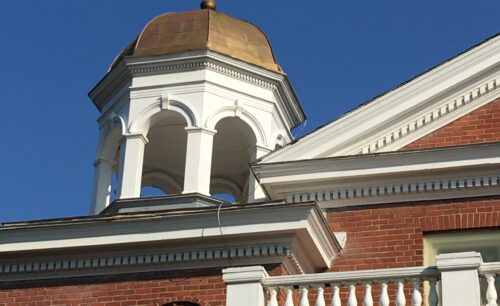 Little Rock AME Zion Church
Little Rock AME Zion Church
In 2016, Forum participants were asked about the Forum’s previous meeting sites. The Little Rock AME Zion Church, 403 N. Myers St. was mentioned. No confirmation of this recollection has yet been found.
The 1911 brick sanctuary at that site was purchased by the City of Charlotte in 1981. The Afro American Cultural Center was launched in 1974, and after the Myers Street building was renovated, the Center moved from Spirit Square to Myers Street in 1986. The church completed its new sanctuary and education wing on the same site in 1981.

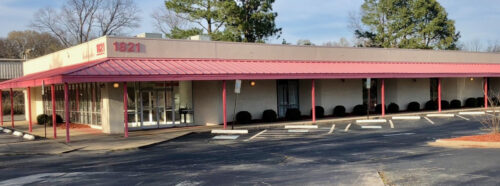
McDonald’s Cafeteria
Between 1949 and 1982, Brooklyn, N.Y. native John McDonald operated out of two small spaces near Lasalle and Beatties Ford Roads. Many former patrons remember the restaurant he built at Lasalle and Beatties Ford Roads and opened in 1972. It was the 1972 building that Christopher Dennis was freshening for reuse in fall 2021 and opened with a Chase Bank branch in November 2021.
In 1982, John McDonald moved his Cafeteria to the building pictured, at Beatties Ford and I-85. There, McDonald had a private dining room to host events. Forum participants remember that its meetings were often held in the expansive main dining room, allowing all diners to participate or merely listen in.
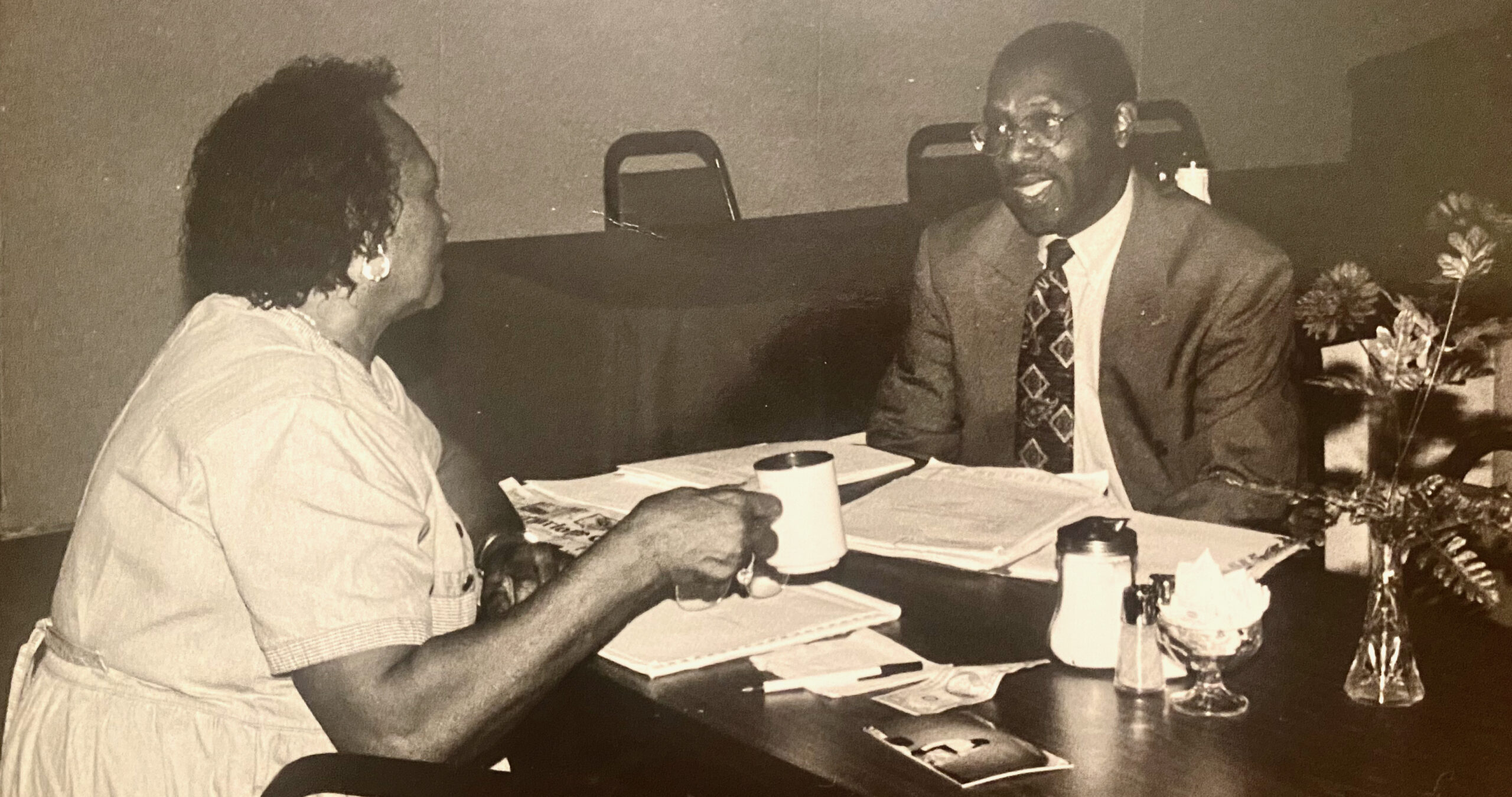
Intermittent media references to the Forum placed it at McDonald’s in 1985 through 1988, 1991 through 1993, 1995 through 1996 and 2002 through 2003. But the Forum’s residency at McDonald’s may have had only one break during that period:

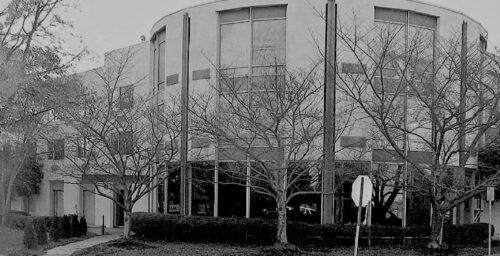
Renaissance Place Restaurant
The 631 N. Tryon St. building opened as the Manger Inn in 1960. After a time as the Executive Inn, it spent a portion of the 1980s closed or being renovated into a Renaissance Place, an independent living center for seniors. The Church Street side of the building was turned into rental office space in that renovation.
Ron Goodwin opened the Renaissance Place Restaurant in 1991. Community groups used the facility for special events and regular meetings. Among the regulars from 1992-1994 was the Black Women’s Caucus, whose leaders included Sarah Stevenson. The groups that put calendar items in area media about their events and meetings at the restaurant in 2000 did not do so in 2001. No media references have been found to Forum meetings at the Renaissance Place, though Forum participants remember the site being used in the late 1990s. They also remember Charlestonian Ron Goodwin’s gentle presence.
The Charlotte Post’s unsigned “Fly on the Wall” gossip column mentioned on Aug. 7, 1997 that Ron Goodwin lost a bidding war with the Gantt investor group to buy and reopen the McDonald’s Cafeteria site. Goodwin moved on with his recipes for “Folly Island Shrimp & Grits” and “Uptown Down South Steak” and opened the Charleston House restaurant on The Plaza in 2004.

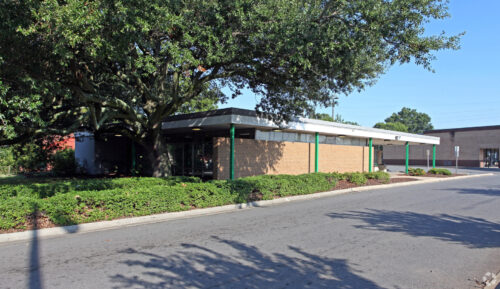
2003:
Northwest Neighborhood Services Center
When McDonald’s Cafeteria closed in June 2003, the Forum met for several weeks in the conference room at the Northwest Neighborhood Services Center in the former Beatties Ford Road Library at 2324 LaSalle St. The 1957 building was built to be a library. The library closed in 1997; the services center had opened in 1998 and was used by the Charlotte-Mecklenburg Police Department. Project LIFT used the building 2013-2019.

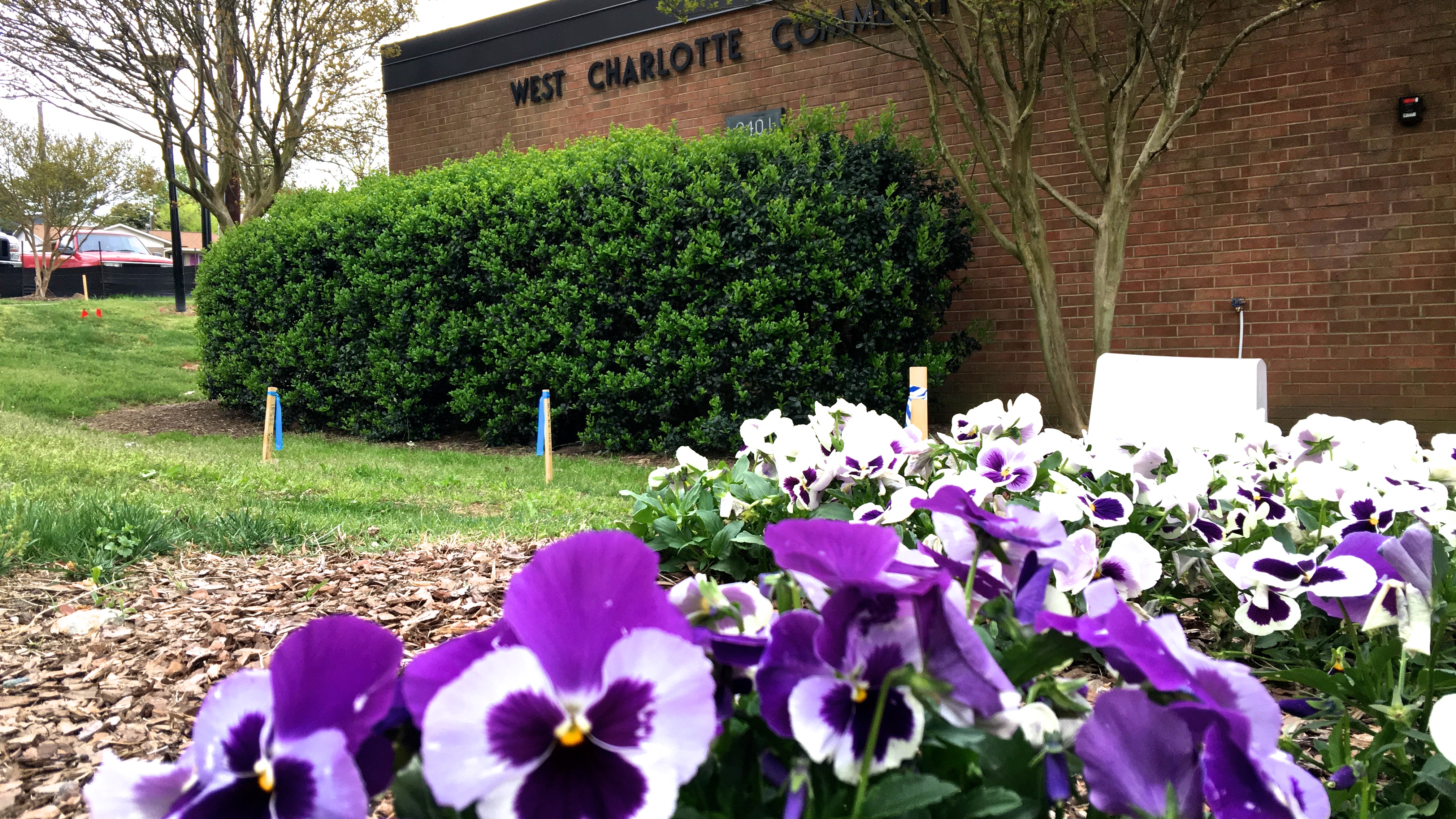
2003-2015:
West Charlotte Recreation Center
The director of the West Charlotte Recreation Center in 2003 was Blanche Penn, a longtime Forum participant. With her help, the Forum moved to a meeting room or, occasionally, to the gym in the Rec Center at 2401 Kendall Dr., down the hill from West Charlotte High School. Records from the Coffee Pot Fund show purchases beginning with a July 28, 2003 meeting.
In August 2014, Park and Recreation officials met with neighborhood residents to outline the building’s first substantial renovation since its construction in the early 1960s. As renovation delays pushed back re-occupancy dates, the Forum wrapped up at West Charlotte on April 28, 2015, and moved to Ivory-Baker Recreation Center for its May 5 meeting.
Before the county’s delayed renovation at West Charlotte Rec Center was completed, there had been a compelling offer on the table from the city’s Belmont Regional Center, and the Forum did not return to Kendall Drive.

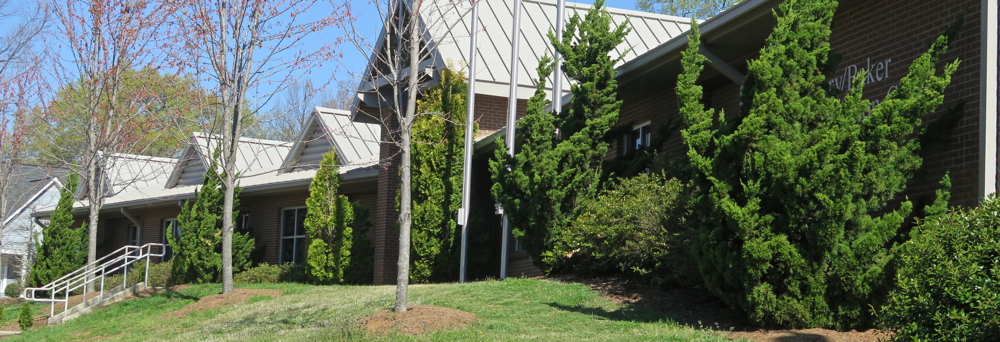
2015:
Ivory-Baker Recreation Center
When the West Charlotte Rec Center renovation was being planned, staff at the Ivory-Baker Recreation Center at 1920 Stroud Park Ct. took the Forum in. No doubt it didn’t hurt that Carlenia Ivory, for whom the building was in part named, was a longstanding Forum participant.
Weekly attendance grew at Ivory-Baker. Reasons might have included that the site was new, or that it was more convenient to downtown worksites. But it was also on familiar turf. The center was built as part of the 1998 federal Hope 6 project to replace the 1940 Fairview Homes segregated black public housing project with a mixed-income neighborhood. Some Forum regulars grew up at the old Fairview Homes, or had family and friends there; others worked there or nearby.
The center’s wi-fi was robust enough that the Forum began livestreaming its meetings at this site, with an Oct. 13, 2015 candidate forum.
Meetings at Ivory-Baker were from May 5, 2015 through Jan. 12, 2016.

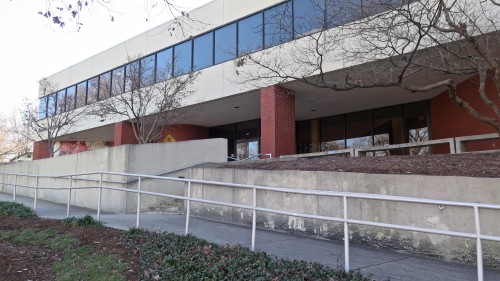
2016-:
Belmont Regional Center
“This is my home,” quipped Forum co-founder Sarah Stevenson as the group began meeting in January 2016 at the city’s Belmont Regional Center, 700 Parkwood Ave.
The building’s prime “tenant” was Community Relations, and Stevenson had played a role in the hiring of department head Willie Ratchford decades before. When Ratchford invited Stevenson to relocate the Forum to Belmont Center, it didn’t hurt that the meeting space would be larger than at Ivory-Baker or West Charlotte Rec Centers. A small parking lot was a minus, but there was on-street parking space available on the east side of the center at McDowell and Parkwood.
The COVID-19 pandemic closed the Center to the public in March 2020. The Forum’s last pre-lockdown meeting was March 10, 2020. Virtual meetings via Webex conference software began in March 2021. In-person meetings resumed at the Belmont Center on May 24, 2022.